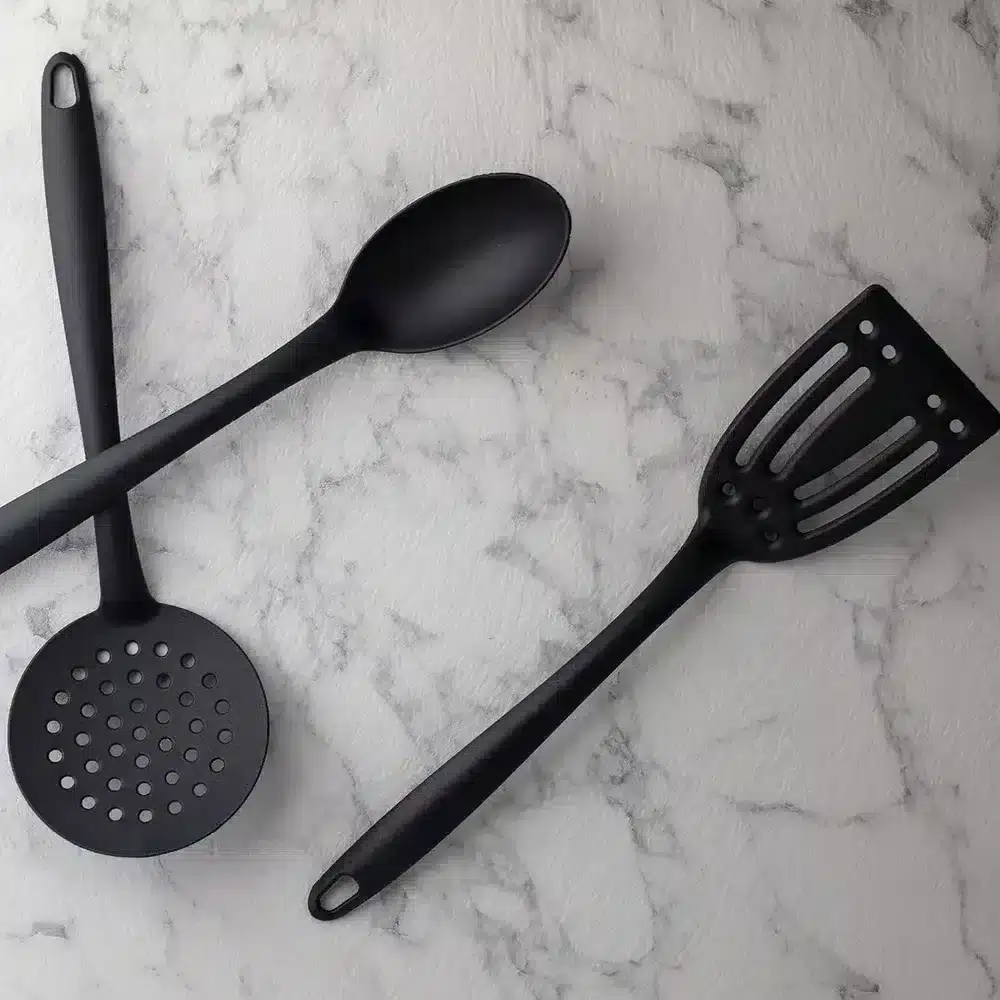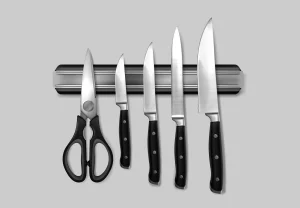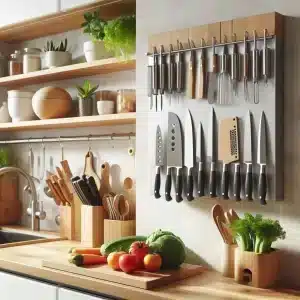Nylon offers many advantages to cookware. Its non-stick properties are perfect for taking care of your cookware. In addition, they are one of the most economical alternatives on the market.
However, as with other materials, nylon also has its disadvantages. Therefore, we have prepared this post with the best and the worst of nylon cookware so you can choose the material you like best for your kitchen.
Nylon cookware is one of the most widely used alternatives because of its non-stick properties.
What are nylon cooking utensils made of?
Nylon cooking utensils are made from a type of synthetic polymer, a plastic that is specifically designed to withstand high temperatures and repeated use in the kitchen.
This material is known for its durability, flexibility, and heat resistance, making it a popular choice for a variety of kitchen tools. Nylon utensils typically resist heat up to 400 degrees Fahrenheit, which ensures they don’t melt easily when used with hot dishes.
Additionally, these utensils are often favored for their non-reactive nature. Unlike some metals, nylon does not interact with acidic or alkaline foods, ensuring that your food’s taste remains unaltered. Moreover, nylon is non-porous and does not harbor bacteria, making it a hygienic option for food preparation.
The strength of nylon utensils makes them ideal for use with non-stick cookware, as they are less likely to scratch or damage the surfaces compared to metal utensils. This characteristic helps prolong the life of your cookware, while also ensuring that harmful particles don’t mix with your food.
Are nylon cooking utensils safe?
Nylon cooking utensils are generally considered safe for everyday kitchen use, provided they are used within their recommended temperature limits. These utensils are designed to withstand high heat – typically up to 400 degrees Fahrenheit. It’s important to avoid exposing them to temperatures higher than this, as it could lead to melting or warping, potentially causing safety hazards or contaminating food.
Another aspect of safety concerns the chemical stability of nylon. This material does not react with foods, be they acidic or alkaline, which means there’s no risk of chemical leaching into your meals during cooking. This non-reactive quality makes nylon a safe choice for cooking and serving a wide range of dishes.
Furthermore, the smooth, non-porous surface of nylon utensils prevents the growth of bacteria and other microbes, contributing to a more hygienic cooking environment. Regular cleaning and maintenance further enhance their safety and longevity.
However, it’s not indestructible. Over time, these utensils can develop scratches or wear, especially if used with abrasive cleaners or exposed to high heat. Regular inspection and replacement of worn-out utensils are recommended to ensure the highest levels of food safety.
The downside of nylon cooking utensils
While nylon cooking utensils have several benefits, like any product, they also come with certain drawbacks. One of the main concerns is their heat resistance limit.
Nylon utensils are typically safe up to 400 degrees Fahrenheit. Beyond this point, they can start to melt or warp, which not only damages the utensil but could also lead to plastic particles contaminating your food. This limitation makes them unsuitable for some cooking methods, such as grilling or use in extremely hot ovens.
Another downside is durability. While nylon is relatively strong, it is not as durable as metal utensils. Over time, it can become scratched, bent, or otherwise damaged, especially if used improperly, such as scraping against rough surfaces or using them to cut. These damages not only reduce their effectiveness but can also become a haven for bacteria, reducing the overall hygiene of your cooking tools.
Nylon utensils are also not as environmentally friendly as some alternatives. Being a synthetic polymer, nylon is not biodegradable, and if not recycled properly, it can contribute to plastic waste. For those concerned about environmental impact, this can be a significant downside, leading them to prefer more sustainable materials like wood or stainless steel.
Benefits of nylon cookware
Nylon cookware offers several advantages that make it a popular choice in many kitchens. Here are some of the key benefits:
- Non-Stick Friendly: one of the biggest advantages of nylon utensils is their compatibility with non-stick cookware. Unlike metal utensils, nylon won’t scratch or damage the non-stick coating on pans and pots. This helps to extend the life of your non-stick cookware and keeps it functioning effectively.
- Hygienic and easy to clean: the non-porous nature of nylon means it doesn’t harbor bacteria as wooden utensils can. This makes them more hygienic, and they are also very easy to clean. Most nylon utensils are dishwasher safe, adding to their convenience.
- Affordable: compared to other materials like stainless steel or silicone, nylon cookware is often more affordable. This makes it a great option for those who want quality kitchen tools without a high price tag.
- Variety of designs: nylon cookware is available in a variety of shapes, sizes, and colors. This versatility means there’s a nylon tool for almost every cooking need, and they can add a touch of style to your kitchen.
How to clean nylon cookware?
Cleaning nylon cookware is straightforward and simple, ensuring that these tools maintain their quality and hygiene over time. Here are the steps and tips for effectively cleaning nylon cooking utensils:
- Rinse immediately after use: to prevent food from sticking, rinse nylon utensils under warm water immediately after use. This step helps to remove any food particles and makes the cleaning process easier.
- Use gentle cleaning agents: for a thorough clean, use a mild dish soap. Harsh chemicals or abrasive cleaners can damage the surface of nylon utensils, reducing their lifespan and effectiveness.
- Soft sponge or cloth: use a soft sponge or dishcloth to clean your nylon cookware. Avoid using abrasive scrubbers like steel wool, as they can scratch the surface of the nylon.
- Scrub gently: if there are any stuck-on food particles, gently scrub the area. Applying too much force can cause the nylon to warp or crack.
- Dishwasher safe: most nylon utensils are dishwasher safe. If you prefer to use a dishwasher, place them on the top rack to avoid exposure to intense heat at the bottom of the dishwasher, which could potentially warp the material.
- Air dry or towel dry: after washing, you can either air dry the utensils or use a soft towel to dry them immediately. This step prevents water spots and ensures that your utensils are ready for their next use.
- Inspect regularly: regularly inspect your nylon cookware for any signs of melting, warping, or deep scratches. If you notice significant wear and tear, it’s best to replace the utensil to ensure safety and hygiene.
- Avoid high heat and direct flames: to maintain the integrity of your nylon cookware, avoid using them on direct flames or in situations where they are exposed to temperatures higher than their heat-resistant limit.





